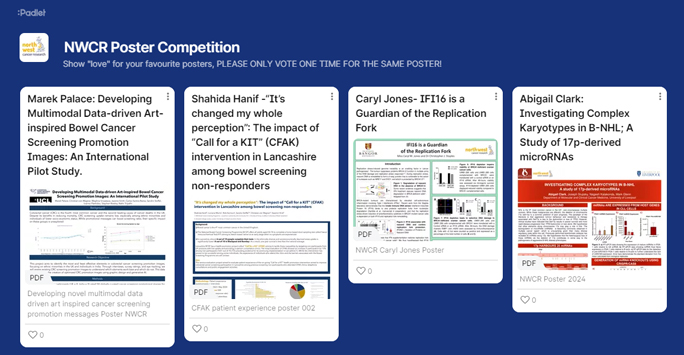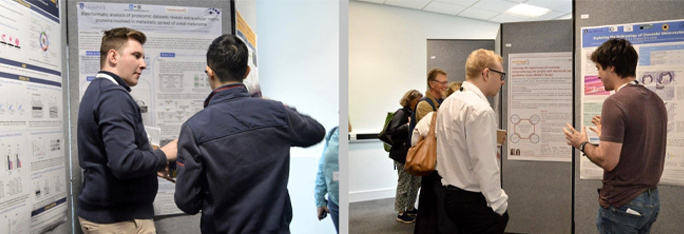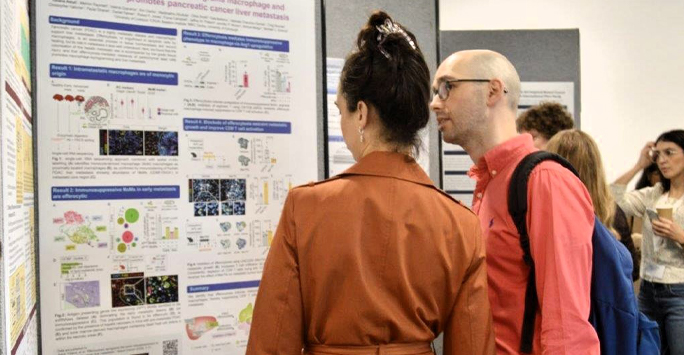Digital Engagement in Cancer Research: Using Padlet at the North West Cancer Research Scientific Symposium
Posted on: 11 July 2024 by Rob Lindsay in Conference & Event Reports

Are you curious about how collaborative digital tools can transform academic events or learning and teaching? Discover how the North West Cancer Research Scientific Symposium integrated Padlet to revolutionise their poster presentations and enhance participant engagement.
Case study: The North West Cancer Research Scientific Symposium
The North West Cancer Research Scientific Symposium has always been a pivotal event for the cancer research community in the North West and North Wales, bringing together academics, researchers, and clinicians from across the region. Building on the success of previous events, this year’s symposium hosted within the Yoko One Lennon Centre integrated Padlet, a collaborative online platform, to facilitate a digital poster presentation, enhancing information sharing, engagement, and networking among participants.

The Symposium facilitated lively discussion and the opportunity for collaboration
Bridging research and collaboration
This year's symposium aimed to bring together academic and clinical staff, postdocs, postgraduate research students, and anyone interested in cancer research. The inclusion of Padlet as a digital platform enabled a complimentary interactive poster presentation experience. Researchers displayed their work in person but were also able to upload their posters to Padlet, allowing participants to view and interact with the posters, regardless of physical location. A QR code was generated to share the poster presentations with attendees, who also used this to vote for their favourite poster.
Highlights of the poster presentation
The digital poster presentation was a key feature of the symposium, with numerous researchers presenting their work on Padlet. The posters covered a wide range of topics, including:
- Understanding the Role of VISTA in Regulating T Cell Function in Triple Negative Breast Cancer by Medina Abdulla.
- Targeting MacroPARP Proteins in Head and Neck Squamous Cell Carcinoma by Hadil Saleh.
- Investigating the Functional Role of BTK PH-Dependent Signatures in Pan-Cancer by Hamdah alsaeedi.
Each poster provided a comprehensive overview of the research, with detailed visuals and data that participants could explore at their own pace. The interactive nature of Padlet allowed attendees to leave comments and questions, explore all the posters through an automated slide show, and engage in a collaborative digital environment.
Engaging the community with interactive features
Padlet's interactive features played a crucial role in enhancing participant engagement. Attendees could 'like' their favourite posters, vote, and provide feedback. This level of interaction, with over 500 votes for the poster prizes, made the experience more engaging and helped identify the most impactful research presentations. Prizes were awarded to the top three posters, recognising the hard work and innovation of the researchers. Winners included:
- Coupling LCM-MS and IMC: A Spatial Proteomic Approach to Understanding Breast Tissue Density and Cancer Risk by Yuxi Zhou
- Macrophage-fibroblast crosstalk promotes liver metastatic outgrowth in pancreatic cancer by Meirion Raymant
- Characterising the Tumour Microenvironment of Liver Metastasis by Jayden Gittens
Benefits of using Padlet for digital poster presentations
The integration of Padlet provided several benefits:
- Accessibility: Researchers and attendees could access the posters from anywhere, enabling broader participation.
- Interactivity: The ability to comment, like, and vote on posters encouraged active engagement and feedback.
- Networking: Padlet facilitated networking by allowing researchers to connect with peers, share ideas, and begin to collaborate on future projects.
Dr. Lorna Young, lecturer in Molecular & Clinical Cancer Medicine commented: “The Padlet presentation of posters was a great addition to the Symposium Day, offering a neat and engaging demonstration of all the hard work the attendees had done. Various guests commented on the "smartness" of Padlet. Thank you, CIE, for all your help”
Rob Lindsay, educational developer in the Centre for Innovation in Education added: “We love to collaborate with innovative colleagues and institutional partners across the University for events like this. The Symposium presented an ideal opportunity to support and disseminate exceptional research in a student-focussed environment. We welcome much more of the same, please!”
Good practice
The success of this year's digital poster presentation at the Scientific Symposium highlights the potential of digital tools in academic conferences. The integration of digital posters can support greater collaboration and innovation in the scientific community. The symposium has set a commendable example, highlighting the power of technology in advancing cancer research.
For those who missed the event or want to revisit the posters, the entries are available on this Padlet: NWCR Poster Competition.

Researchers demonstrated their work physically and digitally at the event
Stay in touch with North West Cancer Research, the leading cancer charity for the North West and North Wales and celebrate the incredible research highlighted at this year’s symposium, plus keep an eye out for future events where they continue to push the boundaries of cancer research and innovation.
The University of Liverpool’s Centre for Innovation in Education
The University of Liverpool's Centre for Innovation in Education plays a crucial role in supporting projects like the North West Cancer Research Scientific Symposium by providing expertise in educational technology and innovative learning and teaching methods. Their involvement ensures that events use the latest digital tools to enhance engagement, foster collaboration and improve inclusivity.
Stay Connected: For more information on integrating digital tools into your academic events or teaching practice, contact the University of Liverpool’s Centre for Innovation in Education (CIE) at cie@liverpool.ac.uk or visit the CIE website.
Keywords: Digital, Research, Presentations, Events, Collaboration, Padlet.